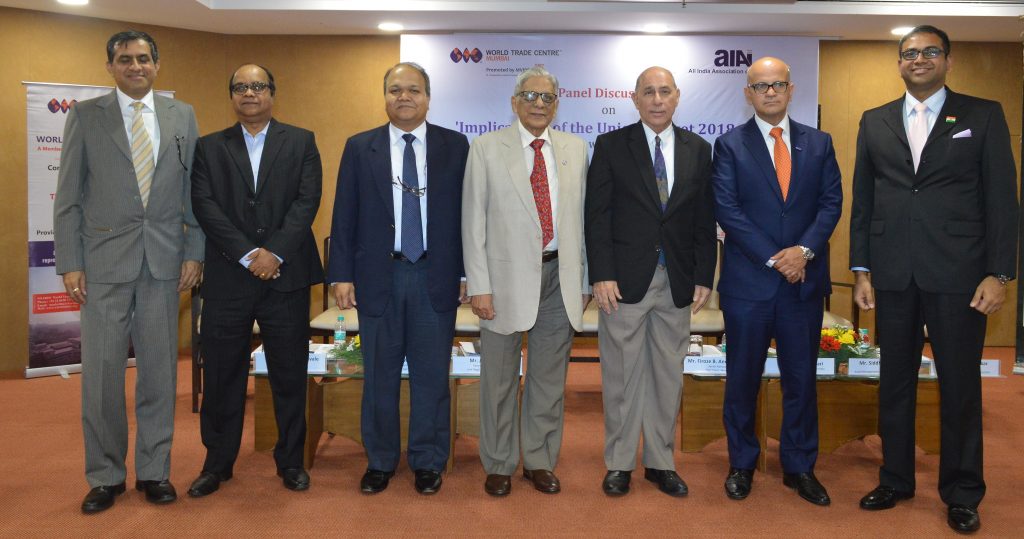“Union Budget 2018-19 is a farmer-centric budget and a step towards universal healthcare and more particularly for the poor people. The reduction in corporate tax for companies upto Rs 250 crore turnover is a welcome step. However, the introduction of LTCG is a retrograde step at a time when India’s economic growth is recovering. The imposition of LTCG will be an additional tax burden on all investors as they already pay Securities Transaction Tax (STT). Therefore, investors are taxed both at the time of purchase and sale of shares. Also, the introduction of LTCG raises uncertainty on computation of losses and the computation of the LTCG itself,” said Mr. Firoze B. Andhyarujina, Senior Advocate, High Court Mumbai at a Panel Discussion on ‘Implications of Union Budget 2018-19’. The Panel Discussion was organized jointly by World Trade Center Mumbai and All India Association of Industries (AIAI) at WTC Mumbai on February 6, 2018.
India is said to be the only country to impose both LTCG and STT on investment in equity.
Mr. Girish Vanvari, National Head of Tax, KPMG in India lauded government for introducing LTCG in a calibrated manner. “The impact of LTCG is not a large as it is made out to be. Although the government has imposed 10% LTCG, most foreign investors may end up paying nil percent or at the most, 5% as LTCG is not applicable for investment arising from tax havens and countries with whom India has signed tax treaties. The government has also grandfathered the existing investments to avoid retrospective implementation of LTCG. Further, the tax authority has released FAQs (frequently asked questions) to address the concerns of non-residents.” Mr. Vanvari said.
Mr. Siddhartha Rastogi, Director - Asset Management, Ambit Capital Private Limited remarked, “The negative impact of the imposition of LTCG will be more than compensated by the prospective gains in stock prices in future. Government will spend the revenue raised from LTCG on rural infrastructure and livelihood creation. This will drive up the sales and revenue of Corporate India. Therefore, we expect the profitability and earnings of Corporate India to grow significantly in the next 3-4 quarters.”
Mr. Rastogi further observed, “Union Budget 2018-19 is not a budget for modern India or for futuristic India, it's a budget aimed at inclusive growth bringing BHARAT & India together. Every Nation once in a lifetime has to take charge to clean deep rooted inequality from face of the society, this budget is a mounting step in that direction. Yourise, You take a higher ground, support your brethren, to emerge as One India, Healthy India and Prosperous India.”
Experts feel that the reduction in corporate tax rate to 25% (from 30%) for companies with turnover upto Rs 250 crore will benefit a wider net of micro, small and medium companies (MSMEs).
In his remarks, Mr. M.S. Mani, Partner – GST, Deloitte India explained the possible impact of the increase in the customs duty on certain category of products. “While the customs duty increases on various products would make manufacturing in India more attractive, in the short term it would also enhance revenue collections which have been a little dented due the lower than expected GST revenues.”

Caption: Distinguished panelists at the Panel Discussion on ‘Implications of Union Budget 2018-19’ at World Trade Center Mumbai. (From Left to Right): Mr. Jayesh Kariya, Partner - International Tax and Regulatory, BSR and Associates, Mr. M.S. Mani, Partner –GST, Deloitte India, Mr. Rajesh S. Athavale, Head-Direct Taxation, JMP Advisors Private Limited, Mr. Y.R. Warerkar, Executive Director, World Trade Center Mumbai, Mr. Firoze B. Andhyarujina, Senior Advocate, High Court Mumbai, Mr. Girish Vanvari, National Head of Tax, KPMG in India, Mr. Siddhartha Rastogi, Director - Asset Management, Ambit Capital Private Limited
Mr. Jayesh Kariya, Partner - International Tax and Regulatory, BSR and Associates pointed out, “Allocation of around Rs 7 lakh crore for farm infrastructure, roads, ports and other projects will create employment and increase income in the hands of the people, thereby kickstarting demand.”
Speaking on other key amendments in the Union Budget, Mr. Rajesh S. Athavale, Head-Direct Taxation, JMP Advisors Private Limited said, “Welcome amendments are proposed through MAT relaxation to insolvent companies which are covered by Insolvency and Bankruptcy Code (IBC), deductions granted to Senior citizens, extension of period for entitlement of deduction available for start-ups and widening the definition of eligible business of start-up companies. At the same time, several amendments proposed which are retrograde in nature, like backdoor entry of some of the items which are struck down by the Delhi Court in relation to Income and Computation Disclosure Standards, the introduction of Long term capital gains tax regime without discontinuing STT and 1% extra cess.”
Mr. Y.R. Warerkar, Executive Director, World Trade Center Mumbai proposed Vote of Thanks for the event.

 : +91 7718886506
: +91 7718886506